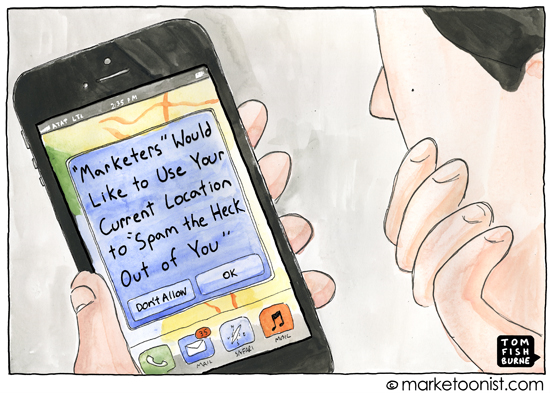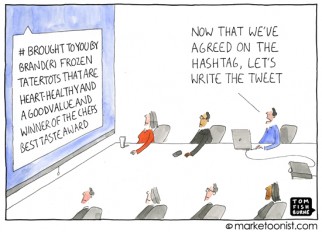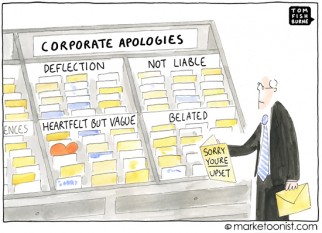Now that everyone carries a GPS-enabled supercomputer in their pockets, the marketing possibilities are endless. Location-based marketing is the new frontier.
But, as with any new technology at a marketer’s disposal, the value is not in the technology, it’s in what great marketing ideas the technology enables. Location-based marketing won’t work if the goal is just to interrupt more effectively. The big ideas matter more than ever.
I was thinking about how brands use technology when I saw Nestle’s location-based “We Will Find You” promotion in the UK. Nestle placed GPS trackers in six chocolate brands like KitKat and Yorkie. After someone opens a package, a prize team stalks the consumer within 24 hours to deliver a check for £10,000 (hoping that the wrapper isn’t in a landfill by then).
Nestle said, “we are delighted to be first to market with this highly innovative GPS based promotion”.
It’s great that they’re trying something new, but the marketing seems driven more by the technology than the idea. It borrows from Willy Wonka, but the execution is more than a little creepy (encouraged by the swap-team theme of the ad). In their enthusiasm for the technology, I think Nestle is forgetting that their consumers may not be as enthusiastic about Nestle finding them.
As Branding Worth Spreading put it, “There’s money, there’s chocolate, but there is no story behind the promotion. There is no magic. Willy Wonka and the chocolate factory made us dream, while Nestle is simply doing an average promotion using GPS technology that aims to build short term sales, but doesn’t do much for the brand long term … It’s disappointing when brands use technology for technology’s sake. ”
With ubiquitous mobile devices, location-based marketing will only increase. Consumers will be the judges as to whether this is useful, or an intrusion. It’s up to marketers to prove the value of location-based marketing — not just the value to us, but to consumers who’ll choose whether to allow it.
(Marketoonist Monday: I’m giving away one signed print of this week’s cartoon. Just share an insightful comment to this week’s post by 5:00 PST on Monday. I’ll pick one comment. Thanks!)



chris Jangelov says
It is an interesting idea that needs to bypass the allow/don’t allow buttons in mobile apps and terminals. On the other hand we are dealing with an Unidentified Buying Object which reduces privacy risks – before the object is identified. After that the data may be problematic. Beware, you under cover agents and cheating spouses!
But we’ve got ourselves a new term: SWAP-marketing. (So Why Ask Peaople-marketing 🙂 Oh no, that’s just plain old spam… (See People As Money)
Steve Willson says
Great commentary! Another example of “just because you can do something…it doesn’t mean you should”. The use of technology is one clear example, right from CRM systems through to Facebook “likes”. I wish that humans would engage their brains more often and put themselves in the consumer’s place.
menglish says
As long as we continue to give consumers the power to choose whether or not to receive location based marketing, it’ll be a great model, both for the company and for the consumer. Once it’s “forced” upon them, we’ll quickly lose. When consumers are in the drivers seat (or so they think), everyone wins.
Sabrina says
I totally agree that “just because you can, doesn’t mean you should” and more examples of that seem to appear the more technology advances. The one thing location can do is make marketing and advertising more relevant. It adds context about the consumer the same way whatever app you are using or article you are reading does. Are they in a city, or a rural area? Are they at a mall with higher intent to purchase something or at an airport just killing time? If marketers think of location more along the lines of additional information instead of a tracking service, I think we will see much better use of it. But as always, you need to understand and consider privacy concerns about passing location, collecting data etc. Technology can open a lot of doors when the possibilities and limits are understood.
Concetta says
This whole idea kind of creeps me out. I just recently upgraded to a full smart phone (as opposed to an older Symbian model) and the amount of apps that ask you to share your location is crazy. No, I am not interested in giving location info to a solitaire app or a candy bar.
The whole idea would turn me off from buying their brand until the promotion was over – and likely, for quite a while after as well.
There’s a fine line between taking advantage of new technology and being a creepy stalker. There would have to be a much richer story and interaction level for me to take part in this, and there’s no way to “opt out” other than not buying the candy bar. Too creepy for me.
Jann Mirchandani says
Reminds me of the Target fiasco where they started sending coupons for diapers and other baby items before the teen’s parents even knew she was pregnant! (http://www.forbes.com/sites/kashmirhill/2012/02/16/how-target-figured-out-a-teen-girl-was-pregnant-before-her-father-did/)
Brands are forcing themselves on consumers in a way that goes way beyond TV commercials we had to sit through because there was no DVR or Netflix. It’s way to personal without the option of saying no.
Had Nestle been more creative in how they implemented it could have been a huge win instead of a massive fail.
Susie says
I think this is clever but should be an opt in model like a scratcher ticket — not automatic. To track someone simply craving chocolate without their permission is not sweet…although hopefully the package told you to throw out the wrapper if you didn’t want to be tracked.
G D says
Ad campaigns and other related web or wifi marketing possibilities for a smart phone or a tablet when used to surf the web are precisely why the first thing I do when enabling a new device is to turn off every function for the GPS. As for this Nestle campaign it is a short term promotion that does catch your eye but I thought more about possibly damaging your teeth if you bite into it than about the prize being offered or the long term branding effects.
Rishab says
Tom – loved your post!
As a lot of people above have pointed out, the thought that one knows your location could either (A) creep you out, or (B) push more unwanted “spam” at you. Brands will need to figure out a way to leverage this technology to communicate their single minded purpose to consumers via an opt-in manner. Needless to say, location marketing campaigns must pass a strict “Could this possibly be SPAM” test, even if it’s an opt-in.
Contrary to what some of my peers above have said, I however feel that there is indeed a great use of location based marketing, even for SHORT-TERM campaigns or promotion, especially so because it is cheaper.
I think a great example of this is how JWT marketed the Melbourne Writers’ Festival (quite a feat, considering the decline in reading actual books due to the rate of adoption of smartphones these days). Do check it out at http://www.jwt.com/wi-fiction, as I feel words alone cannot do justice to the campaign. And the best part is, it seems like the consumers welcomed this interruption and were charmed by it!
tomfishburne says
Hi all,
Great insightful perspective from everyone, thanks! It will be fascinating to see how this new frontier is explored by marketers. This week’s cartoon print goes to Sabrina, who touches on a lot of the nuances that will lead to winning executions.
Thanks!
-Tom
Danié says
Great post! I love the way you write, and the way you are building your brand. Thanks for mentioning my blog (http://bit.ly/brandingworthspreading).
All the best,
Danie